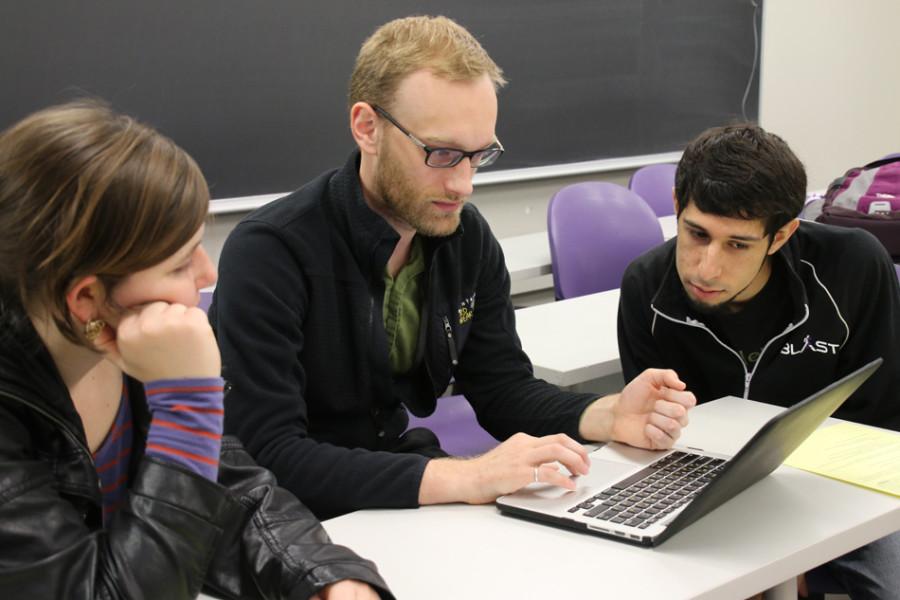Northwestern students look to define life at NU with dictionary project
Drew Gerber/The Daily Northwestern
Communication senior Lilian Smith, Multimedia Learning Center web developer Sergei Kalugin and Weinberg senior Alex Ayerdi work on the Northwestern e-Dictionary. The dictionary aims to define terms that are part of NU culture.
May 25, 2015
Twice a week, in a small room in the basement of Fisk Hall, a group of students sets out to define life, or at least life at Northwestern.
The Northwestern e-Dictionary, or NeD, is an online wiki filled with words and phrases that pervade NU life. Compiled through field studies and interviews with different language communities, NeD represents two quarters of effort by Prof. Elisabeth Elliott’s Weinberg class “Making A Dictionary: The Northwestern Project.”
However, the project’s roots date back three or four years. A professor in the Slavic Languages and Literatures department, Elliott had the idea for a dictionary documenting the culture and language of NU sitting in the back of her mind for a while.
About three years ago, Elliott found herself at the intersection of two different initiatives. Since his inauguration in 2008, University President Morton Schapiro has been working to build a better and more impactful community for undergraduates, Elliott said.
“I thought to myself, ‘How could I be a part of that in a way that draws on my strengths?’” she said.
Then, Elliott was given a grant to attend the 2013 Digital Humanities Summer Faculty Workshop, sponsored by the Arthur Vining Davis Foundations. Part of a push by Weinberg to increase knowledge of digital humanities among faculty and among course offerings, the workshop gave Elliott the skills to design an online dictionary project, which she said allows students to confront the bias inherent in creating a dictionary.
“Part of the project is thinking about how there is bias, where we don’t hide behind a veil of ignorance but bring our biases out and examine them,” Elliott said. “We can’t know everyone’s perspective, but we have to ask ourselves, ‘Are we hearing their voices?’”
One area Elliott highlighted was bias toward NU’s Evanston campus. Students in Evanston will contribute most, she said, although the class is discussing ways to include NU’s campuses in Chicago and Qatar, as well as alumni.
Elliott said the students play an active role in leading the project and everyone is involved as a collaborator. She said the class divides into committees to tackle various aspects of the project.
Weinberg junior Alexandra Saldan is a member of a redesign committee, which seeks to build off the work from last year’s class. She enjoys the Socratic method of the class, which she said is unlike other Weinberg classes she’s taken.
“Prof. Elliott really is a coordinator for our project, not the professor,” Saldan said.
Another committee member, Weinberg freshman Aleksandar Kajmakoski is conducting interviews to study how environmental clubs use language. Everyone in class has different methods, but they share the same goal, he said.
“It’s all about listening to how words are used and avoiding missing their meanings,” Kajmakoski said.
The class hopes more students begin to use the dictionary to expand the perspectives it represents, Elliott said. They also hope the dictionary becomes a resource for incoming students looking to better understand NU before arriving on campus.
Elliott said she will continue to offer the course and she expects the class to continue to evolve. As future classes build on the current foundation, she thinks the dictionary will evolve as well.
“Like all dictionaries, it’s always updating. It’s a never-ending project,” Elliott said.
Email: [email protected]
Twitter: @dagerber












